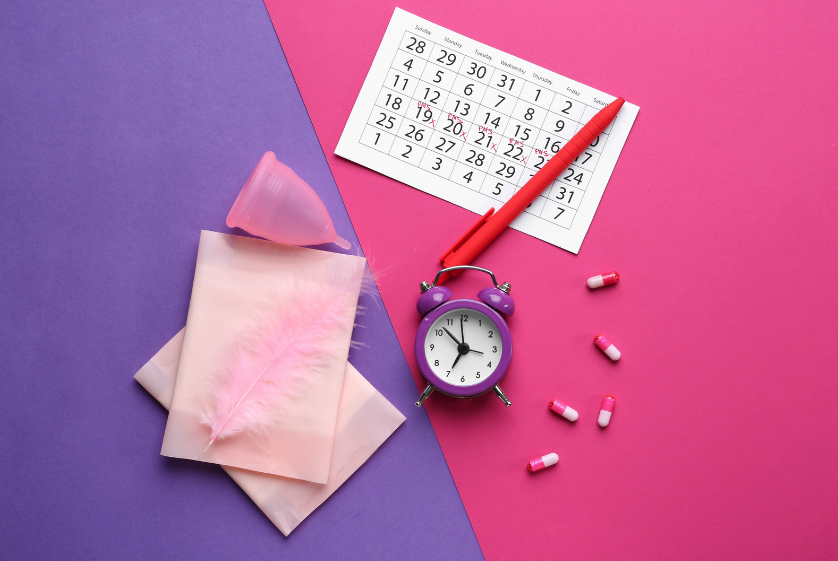Periods can vary greatly from woman to woman and over the course of a woman’s life. What is a normal period? Is there such a thing as a normal period? If you’re wondering if your menstrual cycle is normal, we have answers.
Menstrual Cycle Overview
The menstrual cycle is all about hormones and the process of ovulation. Women have monthly menstrual cycles that occur when one of the two ovaries releases an egg that passes into the uterus. If the egg is fertilized and attaches to the lining of the uterus, pregnancy can begin. If the egg isn’t fertilized, the lining of the uterus is shed through the vagina. Thus the menstrual period begins.
Under normal circumstances, periods can take place from 21 to 35 days apart. They can last from two to seven days, with bleeding that is light or heavy in nature. When you’re younger, periods tend to be heavier and longer. Some women experience intense cramps, while others have relatively pain-free periods. As you age, the length can become shorter and more regular.
In other words, periods vary greatly! If you are concerned about your cycle, talk to your OBGYN about what you’re experiencing. They will be able to help you understand whether your period is normal, and if not, take action to test you for possible causes of irregularity, heavy bleeding, or pain.
Taking birth control pills regulates menstrual cycles. If a woman has very irregular and heavy cycles, it may be prescribed to help control the menstrual cycle. The IUD and birth control shots also alter a woman’s hormones and periods. Talk to your OBGYN about how these methods affect your cycle.
Menstrual Cycle Tracking
It may help to take notes about your period so you know more about what is normal for you. There are tracking apps, but you can also simply note the start and end date on a calendar or in a journal. Your flow, cramping, and mood can be noted for future reference when you see your doctor. If you are having spotting or other abnormal discharge or bleeding between periods, write it down, and if it persists for three months or more, contact your doctor.
If you are trying to get pregnant, cycle tracking becomes more important. The more you know about your period regularity and flow, the easier it will be to know when you might be ovulating or pregnant. If you miss your period or if your period is late, you can take a pregnancy test at home, then schedule an appointment with your OBGYN. If you have trouble getting pregnant, your notes about your menstrual cycle can help your doctor diagnose any issues that might be making it difficult for you to become pregnant.

What Else Can Cause Abnormal Periods?
There are a few things that can cause abnormal periods. The most common things are hormonal changes. Included in these changes are breastfeeding and menopause. Extreme weight loss and exercise can disrupt a woman’s period. For example, athletes such as gymnasts and long-distance runners may experience the cessation of their cycles.
Menopause takes place as natural hormonal reductions cause the periods to end completely. As women age, perimenopause often causes shifts in the menstrual cycle. Perimenopause can last for a couple of years. During this time, menstruation can be quite irregular in length, flow, and frequency. The normal transition of menstruation is shorter, lighter periods until they have ceased for a year. At which time the woman is fully in menopause.
Endocrine disorders, uterine fibroids, and pelvic inflammatory disease can also cause menstrual irregularity. Ovarian cysts may cause irregular periods, as can Polycystic Ovarian Syndrome.
Heavy periods can have several causes, most of which are nothing to be concerned about. Be sure to review our blog post about heavy periods for more information.
When Should I See a Doctor About Irregular Menstruation?
If you have irregular periods, that may represent your “normal.” However, if you have any unexpected issues with your period, consider seeing your OBGYN. Here are four things to watch for and contact your doctor about.
- No periods for 2-3 months or more
- Heavy, extended bleeding — more than 7 days and changing pads or tampons every hour
- Periods that are too close or too far apart — less than 3 weeks or more than 35 days apart
- Severe pelvic pain or cramps
We recommend taking notes about any irregular menstrual cycles for several months to get to know your cycle. Bring these notes with you to your appointment with your OBGYN. Most irregular menstrual cycles are nothing to worry about, but if you’re concerned, put your mind at ease with an appointment. Your doctor will assess your periods and listen to what you’re experiencing to determine if any additional testing is needed. Contact West Des Moines OBGYN to schedule your appointment or to ask your doctor’s team questions.


